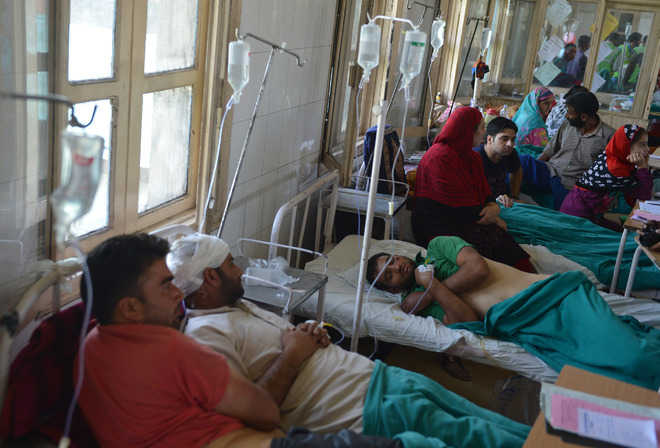Wounds may heal, but scars of trauma stay
Rifat Mohidin
Tribune News Service
Srinagar, August 21
Kashmir is in the midst of another summer unrest with at least 66 civilians already dead and thousands injured. But what is affecting millions of people caged inside their homes for the 44th day of curfew is the slow, silent and invisible emotional trauma which doctors believe will have a long-term impact.
There is restlessness, fear and trauma among residents in the Valley, who see no end to the current unrest. The continuous bloodshed has impacted the families who lost their members or have been been injured. Everyone has an emotional scar that is silently taking root.
“We see images of children being blinded with pellets, people being beaten up and homes being ransacked. We cannot bear it anymore. We are humans, not animals. We are living in fear, but need dignity and respect. We need a solution now, enough of this bloodshed,” said 53-year-old Saira Begum of Srinagar.
“I do not let my two sons go out. I fear for their lives, but they are mentally getting disturbed. They have no future. The violence is taking a toll on everyone. I am not able to sleep,” she said. Apart from bringing physical and economic destruction, two decades of the Kashmir conflict had taken a toll on the mental health of people, particularly women.
In May, the Medicine Sans Frontier (MSF) presented a grim picture of Kashmiris’ mental health. The survey showed that every second adult in the Valley was mentally disturbed due to the violent conflict going on for more than two decades. The study was conducted by the MSF in collaboration with the department of psychology, University of Kashmir, and the Institute of Mental Health and Neuroscience Kashmir.
The MSF report stated that approximately 1.6 million adults in the Valley (41 per cent) were found to be living with significant symptoms of depression and a majority having experienced or witnessed conflict-related trauma.
The clampdown and communication gag had been adding to the trauma, which psychiatrists said was more dangerous than physical injury.
“This time, anxiety has increased due to the situation. In the long term, this can turn into disorders among people. Trauma is more dangerous in the long term than physical injury. It passes on to generations and impacts the whole society,” says Dr Sheikh Shuaib, psychiatrist at Shri Maharaja Hari Singh Hospital.
“Patients are not able to get treatment for mental trauma due to curfew and restrictions. The happenings will have a long-term impact on mental health of the people. There have been these health problems which will aggravate now,” he said.
Doctors cautioned that the present anxiety and mental stress could aggravate problems of those suffering from any mental health problem. “People who are already suffering from hypertension and thyroid can develop adverse effects. Those who lost their family members or saw a dead body or an incident can have more chances of getting impacted,” said another doctor in Srinagar.









